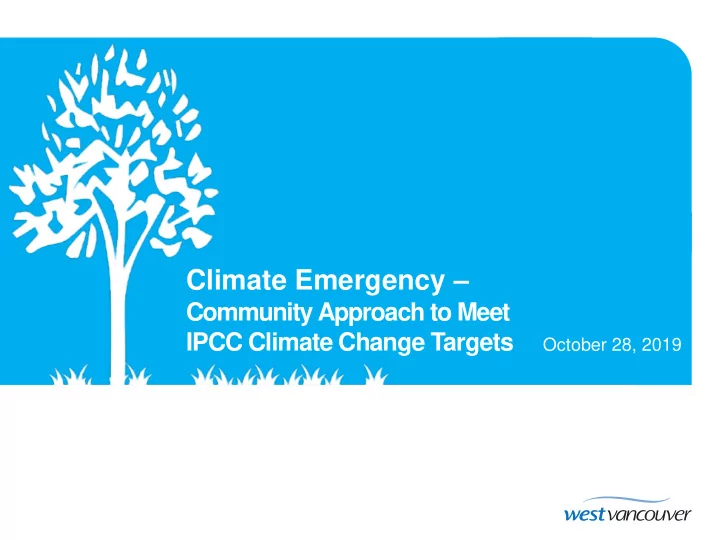

Climate Emergency – Community Approach to Meet IPCC Climate Change Targets October 28, 2019
Presentation Outline 1. Background 2. Policy versus Implementation 3. Climate Mitigation Strategy 4. Staff Recommendation
1 Background CLIMATE EMERGENCY – COMMMUNITY APPROACH TO MEET IPCC TARGETS 3
Previous decision – July 8, 2019 THEREFORE BE IT RESOLVED THAT: (1) Council recognizes that climate change constitutes an emergency for the District of West Vancouver; and (2) Staff be directed to report back at the July 22, 2019, regular Council meeting regarding: i. actions the District is presently taking to reduce GHG emissions (corporate and community) and performance metrics regarding emission targets; ii.actions the District is presently taking to adapt to climate change; and (3) Staff be directed to report back within 90 days regarding: i. actions that other municipalities are taking to reduce their GHG emissions; and ii.an approach to a comprehensive climate adaptation strategy that meets the present IPCC climate change target of 45 per cent below 2010 levels by 2030 and 100 per cent below 2010 levels by 2050. CLIMATE EMERGENCY – COMMMUNITY APPROACH TO MEET IPCC TARGETS
History of community climate planning 2001 – Municipal Leaders signed to participate in the Partners for Climate Protection Program 2008 – Climate Action Charter signed to plan for compact, complete and energy-efficient communities 2010 – Community Climate Action Plan adopted to inform OCP climate action targets and policies 2016 – Community Energy and Emissions Plan (CEE Plan) adopted to support a “better climate and a better community” 2018 – CEE Plan actions embedded into OCP CLIMATE EMERGENCY – COMMMUNITY APPROACH TO MEET IPCC TARGETS
Scientific consensus IPCC established 1988 2018 report identified: 45% reduction by 2030 …and 100% by 2050 CLIMATE EMERGENCY – COMMMUNITY APPROACH TO MEET IPCC TARGETS
IPCC targets are deeper than DWV’s CLIMATE EMERGENCY – COMMMUNITY APPROACH TO MEET IPCC TARGETS
Data availability and consistency Sources and challenges to measuring where we are • Determination of community emissions is complex and evolving • Primary sources are limited and data is subject to delays • Adjustments to baseline data sometimes occur retroactively • Some emissions vary broadly unless normalized for other factors However, the imperative to address GHG emissions is well established and Council can determine its climate actions. Furthermore, while GHGs are global in scope, there are climate actions that only WV Council can take. CLIMATE EMERGENCY – COMMMUNITY APPROACH TO MEET IPCC TARGETS
2 Policy versus Implementation CLIMATE EMERGENCY – COMMMUNITY APPROACH TO MEET IPCC TARGETS 9
Council’s policy framework + Climate & Energy Action recognition Community Planning & Development category CLIMATE EMERGENCY – COMMMUNITY APPROACH TO MEET IPCC TARGETS
What are Council’s policy tools? CLIMATE EMERGENCY – COMMMUNITY APPROACH TO MEET IPCC TARGETS
Policy comparison CLIMATE EMERGENCY – COMMMUNITY APPROACH TO MEET IPCC TARGETS
The emphasis is on implementation Appendices to the report: • outline progress to date in implementing climate policies and • summarize the overlap between WV’s policies and other jurisdictions Council has policies, but greater implementation is required to meet IPCC. IPCC has revised the recommended target. Meeting a new target is only possible if implementation occurs sooner (because the deadline is earlier) and more intensively (because the reduction is greater). CLIMATE EMERGENCY – COMMMUNITY APPROACH TO MEET IPCC TARGETS
3 Climate Mitigation Strategy CLIMATE EMERGENCY – COMMMUNITY APPROACH TO MEET IPCC TARGETS 14
1 Continue CEE Plan Implementation CLIMATE EMERGENCY – COMMMUNITY APPROACH TO MEET IPCC TARGETS
2 Prepare bylaw amendments • Update baselines and targets per new information • Prioritize building systems that use low carbon fuels • Amend Step Code to include low carbon pathway • Require EV parking and encourage low carbon transportation • Improve access to daily needs and enhance active transportation • Require bicycle parking and make vehicle parking same for similar uses • Advance low carbon building construction • Amend Step Code to increase certainty CLIMATE EMERGENCY – COMMMUNITY APPROACH TO MEET IPCC TARGETS
2 Prepare bylaw amendments Official Community Plan Update GHG target and transportation baseline Consider proposals that improve access to daily needs or advance low carbon building construction Promote low carbon in addition to energy efficiency across all sectors Zoning Bylaw Align vehicle parking for similar uses Require EV and bicycle parking Building Bylaw Amend Step Code references to: promote low carbon, schedule increases, consider energy budget Sustainable Buildings Policy Align with proposed bylaw amendments CLIMATE EMERGENCY – COMMMUNITY APPROACH TO MEET IPCC TARGETS
3 Report back with further information CLIMATE EMERGENCY – COMMMUNITY APPROACH TO MEET IPCC TARGETS
3 Report back with further information • Residential neighbourhood regeneration, Empty- nester revitalizations and Missing middle housing: apply low carbon lens to neighbourhood character consideration, and review development procedures to support delivery • Low carbon, low cost retrofits and Engagement & outreach: address barriers to improve existing home efficiency and to convert space and water heating to low carbon systems • Apartment and commercial building code: adopt mass timber building code to reduce emissions from construction • Rapid transit and Bus service extension: expand sustainable trip options, improve business access to customers and workers, and support younger and older resident mobility • Complete streets & active travel, EV & smart parking: prioritize low carbon transportation in updated Strategic Transportation Plan • Trash & treasure: collaborate with Metro Vancouver to continue emissions reductions • Urban forest & tree stewardship: Consider future carbon storage in soil, water and vegetation CLIMATE EMERGENCY – COMMMUNITY APPROACH TO MEET IPCC TARGETS
4 Recommendation CLIMATE EMERGENCY – COMMMUNITY APPROACH TO MEET IPCC TARGETS 20
Recommendation THAT 1. The approach to a comprehensive climate mitigation strategy to reduce community greenhouse gas (GHG) emissions be received for information; 2. Staff commence preparation of the proposed bylaws and policy amendments listed in Table 2 of this report; and 3. Staff report back with further information and analysis of the studies listed in Table 3 of this report. CLIMATE EMERGENCY – COMMMUNITY APPROACH TO MEET IPCC TARGETS
Recommend
More recommend